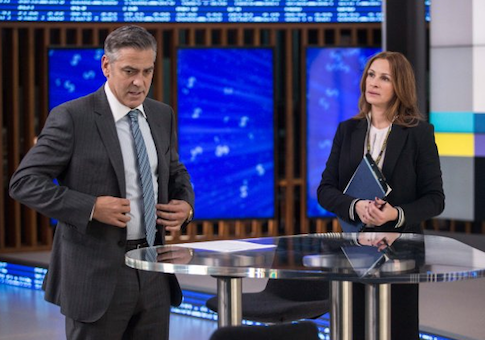If you want a business journalist to do his job, strap a bomb to his chest and point a gun at his head on live TV.
That’s my takeaway from Money Monster, at least, which adopts the John Q (2002) approach to effecting social change. In that film, you may recall, Denzel Washington takes a hospital hostage after the bureaucrats in charge refuse to sign off on a heart transplant for his son. Money Monster, meanwhile, sees Kyle Budwell (Jack O’Connell) take a television studio hostage after a stock pushed by Lee Gates (George Clooney) goes in the tank, $800 million disappearing in the blink of an eye thanks to a "computer glitch."
Budwell’s mad as hell and he’s not going to take it anymore, having lost $60,000 in a matter of moments and barely getting by in New York City on his $14 an hour wage. He’s embarking on this suicide mission on behalf of every little guy screwed out of his life savings while the big money guys get bailouts and golden parachutes. The only way Gates is going to get out of this is if show producer Patty Penn (Julia Roberts) keeps her cool, puts on her reporter pants, and figures out just how Ibis Clear Capital managed to lose the gross national product of a small nation in a few minutes.
Money Monster is silly and melodramatic and premised on a sort of category error, that programs such as Jim Cramer’s "Mad Money" are examples of journalism rather than entertainment. The film also undermines its central argument, that the stock market is a game rigged against The Average Kyle, by revealing that Ibis and its founder, Walt Camby (Dominic West), engaged in illegal shenanigans.
Those caveats aside, it’s also far more entertaining than I thought it would be. Far from the painfully earnest snorer that the first trailer—which featured an acoustic song from Bruce Springsteen set to shots of Wall Street perfidy—promised, Money Monster is surprisingly funny, impressively acted, competently shot, and remarkably efficient, clocking in at just under 100 minutes. Money Monster may be a dopey message movie, but it’s likeable enough.
Like Money Monster, High-Rise is a film about income inequality. Unlike Money Monster, High-Rise is a bit of a mess, bloated and meandering. As far as meandering, bloated messes go, however, High-Rise has its moments.
Based on the J.G. Ballard novel of the same name, High-Rise is set in Britain in the mid-1970s, a time of economic chaos and social upheaval on the island nation. The film is more or less an extended metaphor for England at the time, which was beset by rolling blackouts, three-day workweeks, and constant labor unrest.
On the top floor of the eponymous modernist monstrosity lives the architect, the appropriately named Royal (Jeremy Irons): one arrives at his penthouse suite via a fancy mirrored elevator and marvels at the rooftop garden, big enough for his wife to ride a horse on. The lower levels, meanwhile, contain families like that of Helen and Richard Wilder (Elisabeth Moss and Luke Evans, respectively), who endure power outages and poor conditions even as their betters live the high life.
Think Snowpiercer, but oriented vertically rather than horizontally.
Our protagonist is neither rich nor poor, but a man of the professional middle class, Dr. Robert Laing (Tom Hiddleston). Our entrée into the world of the High-Rise, Laing empathizes with the lower orders and is befuddled by his betters; no class warrior he, Laing simply wants to go along to get along.
The more amusing moments of High-Rise involve Laing’s dogged attempt to maintain his middleclass normalcy—working out on the building’s rowing machine even as looters stroll through the gym, buying paint in the supermarket even as the residents riot over food—in the face of anarchy.
High-Rise is a more ambitious though not necessarily better film than Money Monster, insofar as it actually attempts to show what a revolt of the masses would look like. It reminds me of Fight Club because it seems to both endorse revolution before critiquing the inevitable chaos and fascism that revolutions usher in.
The cast is top notch, from Irons and Hiddleston on down. Special mention should be given to James Purefoy, playing a variation on the brutish aristo he so perfectly portrayed on HBO’s Rome. High-Rise, stylistically mannered and more interested in metaphor than in story, won’t be to everyone’s taste. But its darkly comic style and sinister undertones are a welcome change of pace if you’re looking for something a little less literal than Money Monster.
